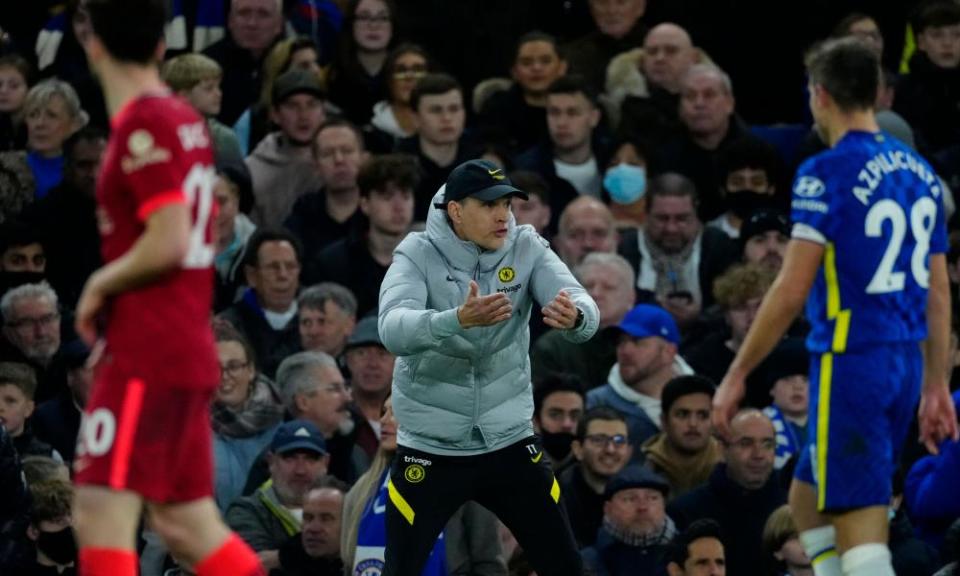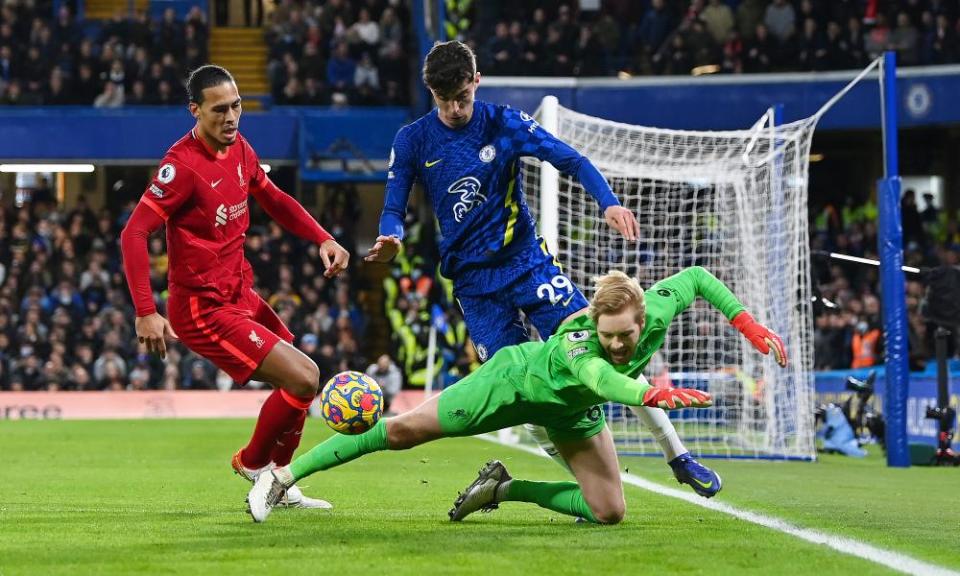Lukaku issue looms large but Chelsea are really suffering for loss of control

Thomas Tuchel brought instant tactical balance last season but now the team look vulnerable and the squad appears fragile
Thomas Tuchel used to be about control. When he arrived at Chelsea a year ago, that was what he brought: suddenly a team that had been desperately vulnerable on the break stopped conceding on the counter. They held the ball and the 3-4-2-1 gave them a natural defensive structure with two midfielders stationed in front of the defensive line. They won the Champions League because they showed how it was possible to play pressing football without leaving yourself open in transition.
That had always been Manchester City’s issue, less in the Premier League (although teams such as Leicester have often troubled them, as they did last week even in conceding six) than against top European sides. They were a remorseless attacking force, as imposing as the Death Star, but they also had that fatal exhaust port that meant they could be destroyed. To an extent that is intrinsic to the philosophy: push high and of course there will be space behind the defensive line; the question was how to guard against balls played into that space without losing the aggression of the press.
Related: Thomas Tuchel refuses to guarantee Lukaku return to Chelsea team
City have clearly worked on that. Even in possession they often have five men behind the ball. They are more measured in their approach now than they were when Pep Guardiola first arrived in England. But it was Tuchel’s Chelsea who seemed to have found the balance, beating City three times in the final seven weeks of the season, including in the FA Cup semi-final and the Champions League final.
But while City march on, only 10 points dropped in the league this season, Chelsea have lost that sense of control. Having conceded four goals in their first 12 league games of the season, they’ve conceded 12 in the past nine, with only one clean sheet. Their form has been far from disastrous: they have lost only one of those games, but equally they have won only three. And as so often, once the rot sets in, it spreads rapidly.
Romelu Lukaku, having suggested he was unhappy with the 3-4-2-1 to which Tuchel has returned, will have further talks with the management on Monday. That is significant not only because he cost £97.5m and ideally wouldn’t be talking about how he pines for Inter eight league starts after leaving them, but because he seemed the solution to the slight toothlessness that was the only real doubt towards the end of last season. Not only is he a habitual goalscorer – only once in the past 12 seasons has he failed to get into double figures – but he is a player whose movement seemed ideal for Chelsea: why wouldn’t the same drift out to the right to create space for Kevin De Bruyne that has worked so well for Belgium work also with Chelsea’s inside-forwards?
But as he has struggled to make a consistent impact, so Chelsea’s entire forward line has come under scrutiny: £71m for Kai Havertz, £58m for Christian Pulisic, £47.5m for Timo Werner, £34m for Hakim Ziyech … some have suffered injury or illness and some or all may yet come good, but that’s £308m on five players over two and half seasons, none of whom could be said to have yet been a resounding success. Chelsea’s leading scorer in the league last season was Jorginho; this season it is Mason Mount.

Tuchel arrived with a reputation for prickliness, as somebody with a tendency to fall out with players, directors and journalists eventually, but for most of the past year has been drily charming. Only in the last weeks has that begun to change, the Lukaku interview and its fallout the first real sign of tension with his squad. Resolving that situation feels vital, not only because Chelsea need a Lukaku figure scoring goals and leading the line, but because the history of Chelsea managers who cannot accommodate big signings is not good.
But everything, ultimately, comes back to that loss of control. It didn’t matter that Chelsea’s wing-backs had scored more than their forwards when they were keeping clean sheets; the grumbling of a high-profile player matters less when you are winning games. The loss of Mateo Kovacic, first to a hamstring injury and then to Covid, has been hugely costly: Chelsea have conceded only four goals in his 10 league starts this season and three of those have come in the past two games when, Tuchel has acknowledged, he was rushed back.
His absence, and N’Golo Kanté’s ongoing struggles with a knee injury, have increased the pressure on Jorginho, who has at times looked distinctly weary, notably in the defeat at West Ham. The deadline-day loan signing of Saúl Ñíguez, who has managed a total of 164 league minutes for Chelsea, has not worked out, and Ross Barkley, 154 league minutes this season, surely has no future at the club.
Injuries have also played havoc in the back five, with Reece James and Ben Chilwell particular losses. But there is also self-inflicted uncertainty, with Antonio Rüdiger, Thiago Silva and Andreas Christensen out of contract in the summer. After announcing losses of £145.6m last week, a squad that last season seemed vibrant, ready for years of domination, has somehow come to look fragile.
Which just goes to show how rapidly things can spin out of control. The loss of the attribute that defined Chelsea in the second half of last season is now threatening to undermine the whole project. Sorting out Lukaku may be the priority, but Chelsea also have to get that sense of control back.

 Yahoo Sport
Yahoo Sport 





































